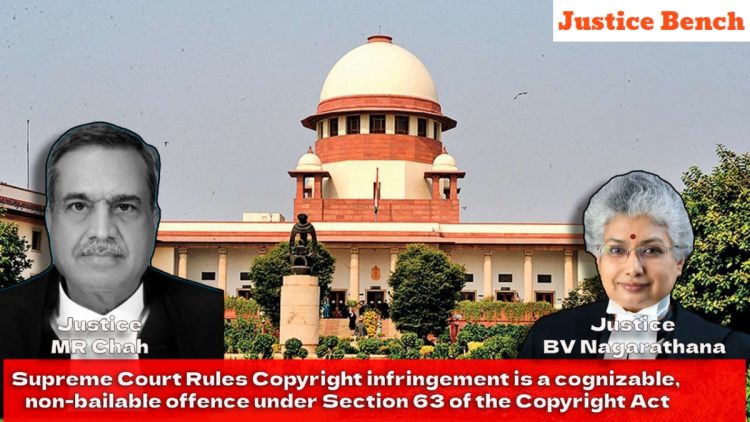The supreme court in the case of M/s Knit Pro International vs State of NCT of Delhi set aside a Delhi High Court decision declaring Section 63 of the Act to be a non-cognizable and bailable offence.
In a landmark decision, the Supreme Court ruled that infringement of copyright under Section 63 of the Copyright Act is a cognizable and non-bailable offence.
The Division Bench comprising Justices MR Shah and B V Nagarathna set aside a Delhi High Court decision from November 25, 2019 that declared Section 63 a non-cognizable and bailable offence.
“It is observed and held that offence under Section 63 of the Copyright Act is a cognizable and non-bailable offence. Consequently, the impugned judgment and order passed by the High Court taking a contrary view is hereby quashed and set aside and the criminal proceedings against respondent no. 2 for the offence under sections 63 & 64 of the Copyright Act now shall be proceeded further in accordance with law and on its own merits treating the same as a cognizable and non-bailable offence,” .
The Court Held
To set the stage, the appellant-company had asked a Chief Metropolitan Magistrate to file a first information report (FIR) under Sections 63 and 64 of the Intellectual Act against one Anurag Sanghi, a resident of Pitampura, for alleged violation of the firm’s copyright work.
After reviewing the evidence, the Magistrate directed the police to file a FIR against the defendants.
The FIR was challenged in court, and on November 25, 2019, the Delhi High Court quashed it on the grounds that Section 63 is a non-cognizable and bailable offence because it does not carry a sentence of more than three years.
RK Tarun, the company’s lawyer, argued before the Supreme Court that the Delhi High Court erred in ruling that Section 63 isn’t a cognizable offence and that it doesn’t belong under Part II of the First Schedule of the Code of Criminal Procedure (CrPC).
He further said that the High Court misinterpreted the Supreme Court’s judgement in the matter of Rakesh Kumar Paul versus State of Assam by not adequately appreciating it.
Tarun further contended that in order for a case to be cognizable, the punishment should be three years or more in prison and a fine, as is the case with Section 63, and that the same should be understood as a cognizable and non-bailable offence.
However, senior counsel Siddhartha Dave, who represents the accused, defended the High Court’s ruling, claiming that it correctly understood the law as put down by the Supreme Court in the Rakesh Kumar case.
After examining the opposing arguments, the court resorted to Section 63 of the CrPC, as well as Part II of the First Schedule, which distinguishes cognizable and non-cognizable offences depending on the penalty.
It went on to say that an offence is only non-cognizable if it is penalised by less than three years in prison.
“Thus, for the offence under Section 63 of the Copyright Act, the punishment provided is imprisonment for a term which shall not be less than six months but which may extend to three years and with fine. Therefore, the Magistrate may sentence the accused for a period of three years also. Only in a case where the offence is punishable for imprisonment for less than three years or with fine only the offence can be said to be non-cognizable,”.
The language of the provision in Part II of the First Schedule is very plain, according to the bench, and there is no ambiguity.
As a result, the Supreme Court found that the High Court erred in determining that the violation of Section 63 of the Copyright Act is a noncognizable violation.
“Thereby the High Court has committed a grave error in quashing and setting aside the criminal proceedings and the FIR. Therefore, the impugned judgment and order passed by the High Court quashing the criminal proceedings/FIR under Section 63 of the Copyright Act deserves to be quashed and set aside,”.
The Supreme Court reached a verdict.
As a result, the case was remanded to the High Court with instructions to reconsider it.
Read Judgment













